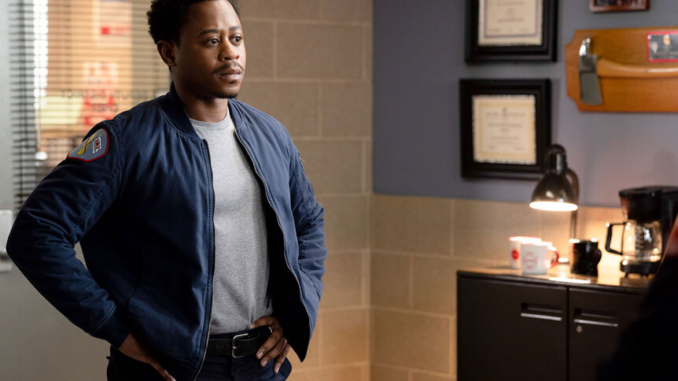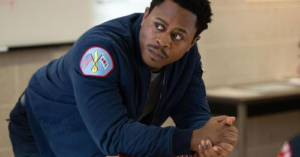
“Chicago Fire” actor Daniel Kyri remembers he accidentally drank bleach on controversial reality show “Kid Nation”
“It chokes off your oxygen so you can’t breathe,” Kyri says in new episode of Vice’s “Dark Side of Reality TV.”
Before it even aired, the 2007 CBS reality series Kid Nation — in which 40 children ages 8-15 were plunked in a ghost town in New Mexico to form their own society — was rife with controversy. There were those who opposed the concept of children living unsupervised (except for producers mining their experiment for drama). A parent of one of the children cast even complained to state officials, alleging that multiple children required medical treatment after drinking bleach.
In the latest episode of Vice docuseries Dark Side of Reality TV, Daniel Kyri, who’s now a cast member of Chicago Fire, recalls the moment that he consumed the poisonous substance. His horror story is just one of several dicey moments in the series that, in the days that shows such as Survivor or The Simple Life were proving to the networks they could create popular content at a fraction of the cost. For Kid Nation, for example, one expense — the prizes — were a paltry $20,000 a pop.
“I just grabbed this sort of faintly yellow liquid,” Kyri, who was known as DK, says, noting that he had just awoken and stumbled into the (dirty) kitchen of the home the kids were sharing. “It’s giving citrus. It’s giving lemon. Like, it’s giving fresh.”
He says he took several gulps.

“And then, a burning. And fumes,” says Kyri, who was then 14. “The fumes that kind of rise up. It chokes off your oxygen so you can’t breathe. Somebody grabs the bottle and she smells it, and she’s like, it’s bleach.”
Then an aspiring actor who thought he needed to do the show for his career, Kyri ran to “where all the adults were.” He was treated by on-set paramedics.
Another former cast member, Olivia Cloer, explains that only then did they find out the crew had been sanitizing areas where the cast ate and drank.
“Who leaves bleach in a bottle that looks like it’s supposed to be something that you drink?” Cloer asks. “Around children? What are you doing?”
Producer Emily Sinclair remembers it going down differently, with only “a tiny, tiny amount of bleach mixed with water in one of the bottles” was involved. (Officials later dropped their investigation.)
Still, it was not what Ron Cloer, the father of Olivia and another daughter who were cast in the show, had expected. He says he was excited about the prospect of them being exposed to other smart kids and experiences they wouldn’t have in suburban Indianapolis.
But if he’d only known. Former participants explain in the docuseries that they were left almost completely on their own, because producers were simply there to video them and create a good story. They didn’t have beds or even enough food for all of them to have three meals a day. Their living quarters were filthy. Bullying was rampant.
“It was very much like, what if there was a real life version of Lord of the Flies?” producer Sinclair asks. “But not really that bad, but kind of.”
Jimmy Flynn, who was the youngest cast member, hadn’t even been to a sleepover when he moved into the locale of Bonanza City. Just 8, he ended up leaving the show because of the way he was treated.
“The most unsafe I ever felt, we were like playing out in the street, and I remember I got lassoed by the neck and was like choked and dragged for not a short amount of time,” Flynn says. “And one of the other kids came over and, like, got me undone. And made sure — was like, ‘Oh my god, are you okay?”
After six weeks of chaos, parents were reunited with their children. They were stunned.
“We were shocked when we saw them for the first time,” Ron Cloer says, “because Mallory’s face was dirty and her hair was all nappy, and [Olivia] was all dirty. It was somewhat jarring. And then we walked by the kitchen and there were just these piles of nasty, dirty dishes that had been there for, I don’t know how long. And I felt sick at my stomach.”
Anjay Ajodha, who was 12 on the show, recalls similar reactions from other adults.
“You see our parents’ faces, as they see what we’ve been doing the last 40 days,” he explains, “and they’re just like, ‘This doesn’t seem right. A lot of these children don’t have beds.'”
Sinclair, a show producer, said that while parents were surprised to see “the extremely rustic nature” of the camp, “it never felt inhumane, it never felt cruel.”
But Ron Cloer, at least, feels differently. He says Olivia’s mom was a social worker when her girls filmed Kid Nation.
“Her job is to protect children,” he notes. “So she understands what kids in crisis look like, and I think she realized that, unbeknownst to us, our kids were put in that situation. And she couldn’t believe it.”
